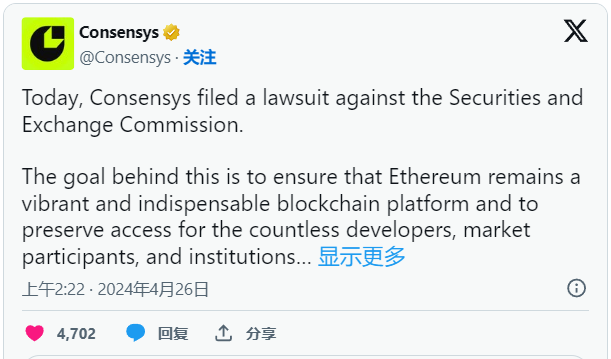MetaMask developer Consensys has asked a Texas federal court to declare that ethereum is not a security, fighting back against a nationwide enforcement action by the U.S. Securities and Exchange Commission (SEC).
Consensys has filed a lawsuit against the U.S. Securities and Exchange Commission (SEC), opposing what it calls an illegal attempt by the agency to redefine its constitutional authority to include regulation of Ethereum (ETH). And claims that Ethereum is the second largest decentralized network in the cryptocurrency field.
According to the blockchain developer, the SEC wrongly labeled ETH as a security and took a "reckless approach" that will stifle innovation if left unchecked.
Consensys announced a lawsuit against the U.S. Securities and Exchange Commission (SEC), accusing the SEC of changing stances when dealing with blockchain technology and mistakenly treating the technology and its applications as a simple and doomed investment scheme without recognizing that Its true value as a breakthrough technology.

Consensys argued in a 34-page legal document disclosed on April 25 that SEC enforcement actions could undermine Congress’ achievements in stablecoin policy and push the technology further outside the United States.
The legal filing is part of a lawsuit filed by Consensys against the SEC, in which Consensys seeks confirmation from the court that the SEC has no legal authority to regulate user-controlled software interfaces built on Ethereum or the Ethereum blockchain.
The filing also mentioned that the SEC’s actions could have a comprehensive impact on the cryptocurrency industry, including impacting the innovation and utility of Ethereum and potentially causing a significant depreciation in the value of Ethereum holders.
In addition, Consensys emphasized that the SEC has previously made it clear that Ethereum is not a security and should not be regulated according to securities standards, and the current change of attitude may have catastrophic consequences for the Ethereum network and Consensys.
Consensys said this "progressive SEC regulatory overreach" goes beyond the scope of U.S. capital markets and runs counter to the regulator's original mandate.
Consensys’ Counterattack
Consensys, the creator of MetaMask, filed a lawsuit against the U.S. Securities and Exchange Commission (SEC) as the SEC ramps up its litigation against the crypto industry and seeks an additional $158 million to regulate digital assets in the so-called "Wild West" ecosystem.
The lawsuit reflects growing tensions between the crypto industry and regulators, with Consensys seeking to challenge the SEC's regulatory authority over Ethereum, seeking a declaration from the court that Ethereum is not a security and arguing that the SEC has no legal authority to regulate Ethereum and build on Ethereum. user-controlled software interface or the Ethereum blockchain.
Meanwhile, the SEC has been accused of taking a "reckless approach" that could stifle innovation if left unchecked. This action by Consensys also shows cryptocurrency companies’ concern about the SEC’s recent actions and the proactive steps they are taking to protect their business models and the interests of the industry as a whole.
Consensys’ lawsuit against the U.S. Securities and Exchange Commission (SEC) comes in response to the SEC’s Wells Notice issued earlier this month. The notice suggested that MetaMask could be accused of operating as an unregistered broker-dealer entity.
Consensys has denied the accusations, insisting that MetaMask only serves as an interface application and does not hold customers’ digital assets or perform any trading functions.
Additionally, Consensys is asking the court to formally declare that Ethereum (ETH) is not a security and is seeking to prohibit the SEC from taking any enforcement action against MetaMask’s Swaps or staking services. Consensys believes that the SEC’s attempt to treat ETH as a security would infringe on Fifth Amendment rights and violate the Administrative Procedure Act.
The industry is uniting to fight an investigation into the Ethereum Foundation, a non-profit organization dedicated to improvements within the ETH ecosystem. As media outlets reported last month, a number of companies and businesses received voluntary inquiries from an unnamed state agency.
Stakeholders like Coinbase and Kraken are fighting in court against Wall Street’s securities regulator, the Securities and Exchange Commission (SEC), after being accused of violating federal regulations. Industry supporters and dissident SEC commissioners, such as Hester Peirce, also maintain that the agency has not provided clear rules for the emerging crypto market.
In the SEC’s lawsuit against Coinbase, Coinbase insisted that the SEC’s accusations lacked reasonableness and emphasized that it underwent an exhaustive SEC review of its business practices before going public.
Furthermore, the SEC's push is particularly detrimental to Coinbase, which generated more than 80% of its revenue from the United States last year and now faces a near-existential threat to its business model.
The SEC believes that Coinbase violated the Exchange Act, the Securities Act and other codes due to a series of "unregistered" behaviors. Coinbase believes that the current rules of the digital asset industry are imperfect and the SEC's actions are actually regulatory overreach.
The above is the detailed content of The developer of MetaMask sues the U.S. Securities and Exchange Commission (SEC) over restrictions on Ethereum. For more information, please follow other related articles on the PHP Chinese website!




